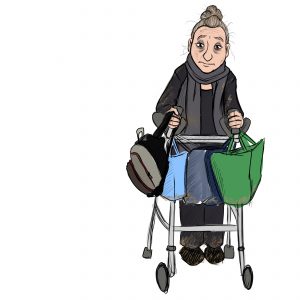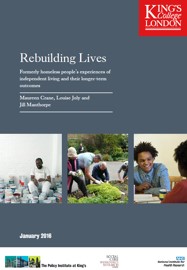Alan Kilmister (Peer Researcher and Expert by Experience with the Policy Institute’s Homeless Hospital Discharge Project) describes proceedings at recent conference organised by the London Drug and Alcohol Forum. (534 words)

Michelle Cornes with Alan Kilmister
I had the pleasure of attending the ‘Addressing Complexity: Homelessness and Addiction’ conference on Friday 18 January 2019 at the Guildhall in London. I arrived at this beautiful venue a little tired after my early start. My first train was at 06:24. However, a few cups of coffee soon warmed me up. It was an excellent event with a wide range of subjects and very good speakers. I was most impressed by the talk by Kevin Dooley (Recovery Programme Consultant) who at one time had been an armed robber, alcoholic and heroin addict with extensive experience of the ‘criminal justice system’! He spoke very truthfully and emotionally about his time on the streets and how when he was in prison his son had died, he received little in the way of compassion and understanding from the system. Some of the other people at the conference with lived experience commented how they were able to fully connect with what Kevin was saying especially with regard to the shame and stigma that goes hand in hand with homelessness and addiction. Kevin made the point that coming to events like these and talking about ‘our’ experiences takes that shame away. I am a firm believer in involving people with lived experience (“nothing about us without us”) and Kevin made the point that we were are still too few in numbers at events like these. The keynote address by Professor Alex Stevens also made this point, highlighting how, a structurally advantaged social group can dominate the cultural, intellectual landscape, while the people most affected by drug deaths have little say (or in the jargon “corporate agency”). I asked the expert panel in the morning session about this topic and there was consensus about the importance of involvement and engagement, and us all doing more to enable this.
I found the talk by Dr Steve Sharman who presented case studies of people’s experiences of homelessness and gambling very interesting. It reminded me of my time in a Hostel in Wolverhampton. A few of the clients living there were addicted to gambling and just around the corner from the Hostel was a big Casino. This made me wonder if they were addicted to gambling before becoming homeless or took to gambling after becoming homeless.
I found the street drinking in East London talk by Dr Allan Tyler interesting too and wondered about boundaries – would the researchers have learned more had they participated in the actual drinking? There was also a very good talk by our very own Dr Michelle Cornes ably assisted by Darren O’Shea and Jo Coombes.

Michelle presented a case study called the Gutter Frame challenge which tells of the barriers people have to overcome if they want to access services following discharge to the street. Finally, I must also offer my compliments on the superb buffet provided at lunch time, and of course the chance for some networking too. This is really important for us, and I was thrilled to be approached by a research manager from a leading charity who invited me to join a new advisory group being set up on peer research. All in all, a very worthwhile and enjoyable day.
Alan Kilmister is a Peer Researcher and Expert by Experience with the Policy Institute’s Homeless Hospital Discharge Project
